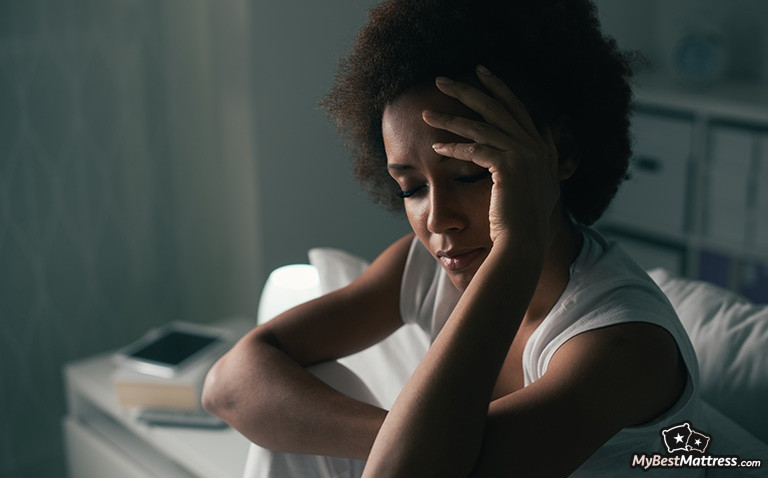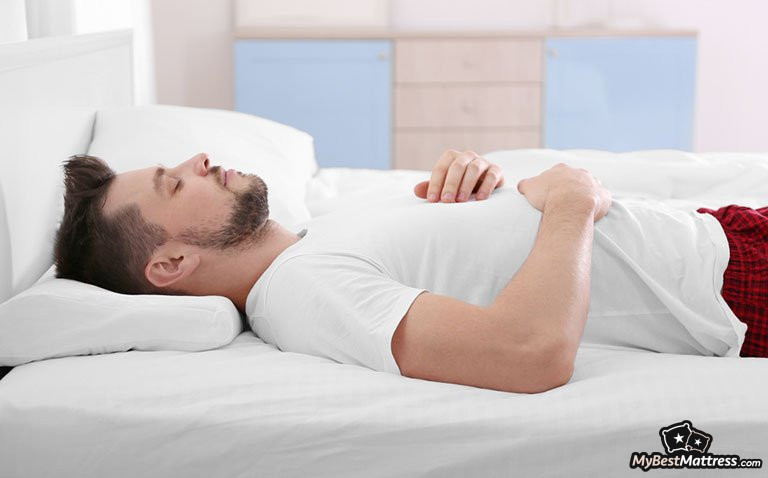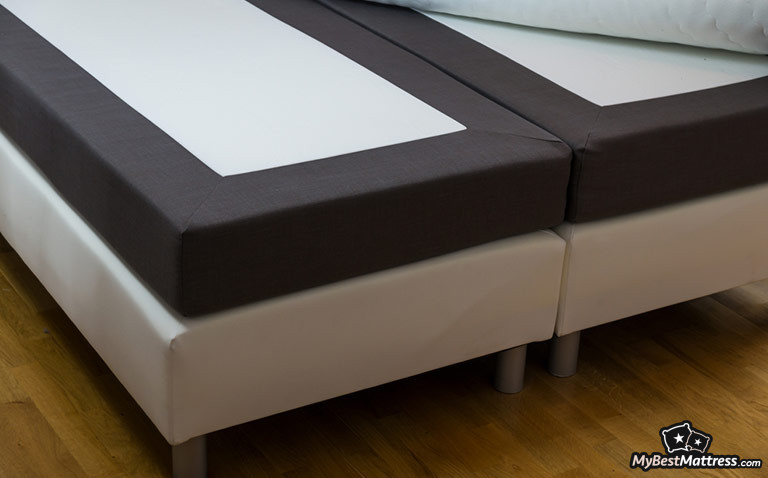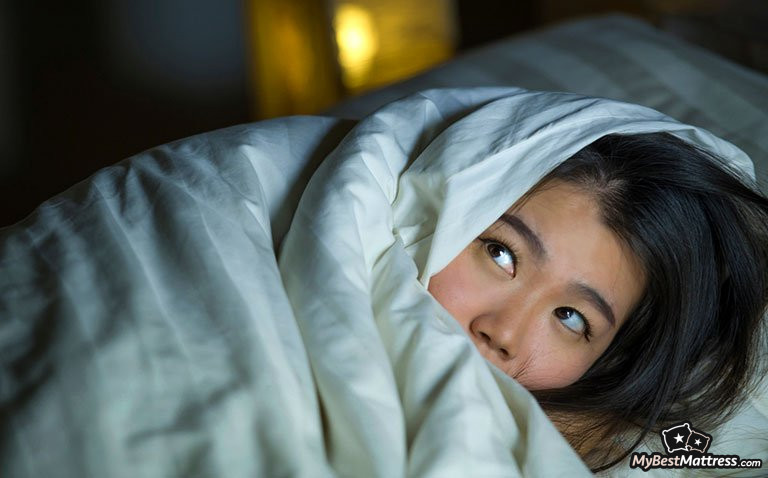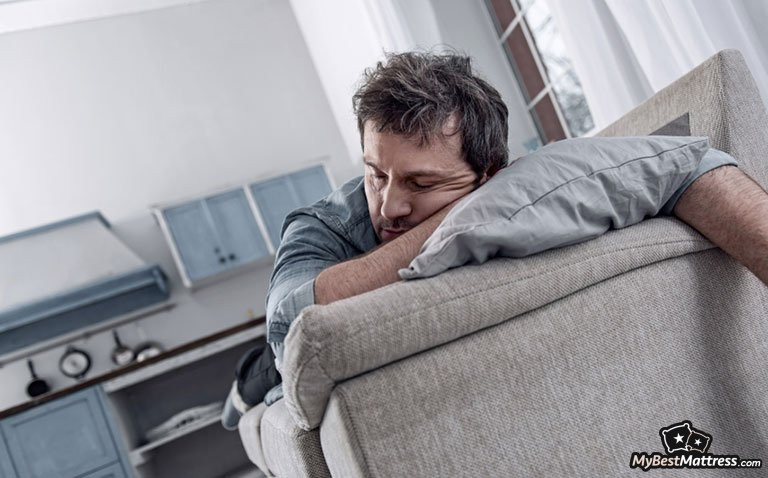
When it comes to sleep, everyone keeps talking about sleep deprivation and the risks that it might cause, however, oversleeping is also associated with serious problems that not everyone is aware of.
So, if you feel that you’re sleeping too much and cannot and have been suffering from excessive sleeping quite some time, then it’s time to look reality in the eye and look for the problem that caused it.
In this guide, you’ll find out how to evaluate whether or not you’re sleeping too much, what issues can hide behind it, what kind of problems it can cause you in the long run, and, of course, how to fix this problem of yours.
Table of Contents
- 1. Sleeping Too Much: the Medical Term
- 2. How to Evaluate if You’re Sleeping Too Much?
- 3. Excessive Sleeping: What’s Behind it?
- 3.1. Narcolepsy
- 3.2. Obstructive Sleep Apnea (OSA)
- 3.3. Depression
- 3.4. Diabetes
- 3.5. Hypothyroidism
- 4. Problems Caused by Excessive Sleepiness
- 4.1. Hearth Disease
- 4.2. Higher Stroke Risk
- 5. Start Fixing Your Sleep Habits
- 6. Conclusions
Sleeping Too Much: the Medical Term
Hypersomnia - a neurological disorder that refers to sleeping too much, and excessive sleepiness during the day. It affects 4% to 6% of the population[1]. Here are the symptoms of hypersomnia:
- Excessive daytime sleepiness. Adults need 7-8 hours of sleep per day, however, if you sleep more than 10 and still feel tired, then it might be an issue.
- Sleep drunkenness. Many people suffering from hypersomnia say that they often wake up feeling confused, disoriented and feel the need to return back to sleep.
- Taking long naps during the day. If you take naps that last 2-3 hours after having a long nighttime sleep, then you should be concerned.
- Difficulty to concentrate. Since Hypersomnia patients often feel the lack of sleep and find it difficult to wake up, the ability to concentrate can also be an issue.
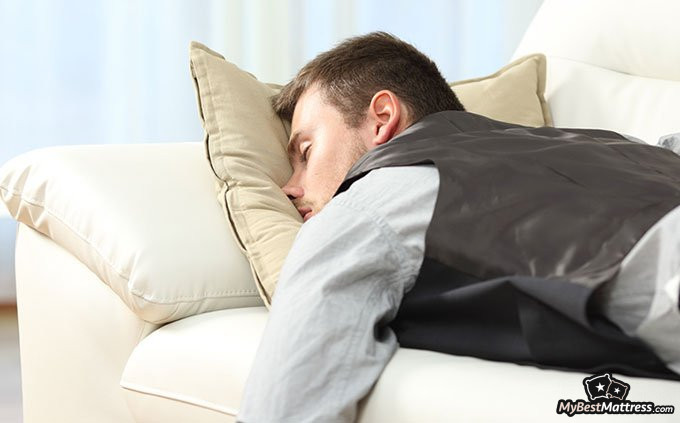
About 5% of adults[2] experience excessive sleepiness during the day, and, as you can see, it can have a major impact on a person’s health, quality of life, and even safety.
If some of the symptoms seem familiar to you, then visit a doctor and discuss your concerns - those symptoms can be linked to conditions that are easily treatable.
How to Evaluate if You’re Sleeping Too Much?
When you say that you’re sleeping too much, you should know that each individual perceives it differently. While some individuals sleep 10 hours per day and believe that it’s completely normal, others think that 8 hours of sleep is too much. So, how it actually is?
65 studies[3] representing 3,577 healthy individuals aged 5–102 showed that young adults (18-15 years old) and adults (26-64 years old) should sleep 7-9 hours per night, whereas older adults (older than 64 years old) need 7-8 hours of sleep.
What’s even more important to understand is that sleep quantity is not the only aspect that matters, sleep quality and sleep timing (when you go to sleep and when you wake up) are also crucial.

Therefore, if you’re sleeping 7 hours and wake up fully rested, it means that you had quality nighttime sleep. On the other hand, some individuals wake up tired after sleeping for 10 hours. It could mean that they had frequent nightly interruptions or experience disruptions in their sleep cycle and go to sleep way too late.
Excessive Sleeping: What’s Behind it?
There are many sleep disorders and mental issues associated with excessive sleeping. Even though they’re not always linked directly, it’s something that you should be aware of.
Narcolepsy
Narcolepsy is a neurological disorder that affects your sleep-wake cycles and causes the inability to regulate them. Here are the main symptoms that can signalize that you’re suffering from narcolepsy:
- Sleeping too much and excessive sleeping during the night.
- Muscle loss also called Cataplexy. Individuals who experience this problem say that they feel sagging face muscles, weakness in their neck and knees. These experiences are often triggered by sudden emotional reactions, such as anger, laugh or fear.
- Nightly interruptions - you might experience multiple wake-ups during the night.
- Sleep paralysis. This condition is also often associated with sleep paralysis that is the inability to speak or move when you wake up while seeing and hearing things that are actually not there.
- Hallucinations. Seeing what's not actually there.
Latest Saatva Coupon Found:
UP TO $500 OFF
Limited-time Saatva Sale
We're sharing a limited-time Saatva mattress discount with our readers! Grab this deal & enjoy your new mattress with huge discounts.
Obstructive Sleep Apnea (OSA)
Sleep Apnea[4] is a sleeping disorder that can create pauses in your breathing when you’re sleeping. It can last from a few seconds to even a few minutes and often goes together with loud snoring. Thus, if your partner or you are a snorer, this might be the problem that caused it.

People who suffer from sleep apnea often experience:
- Sleeping too much, excessive daytime sleepiness.
- Problems with vision.
- Difficulty to focus, the lack of alertness.
Since obstructive sleep apnea is associated with the lack of alertness, you might get into various driving accidents and work-related incidents. When not treated, this condition can cause serious health issues, such as diabetes and hearth problems. What is more, there’s a chance of dying due to the lack of oxygen.

Did you know?
Have you ever wondered which mattresses are approved as the best for sleep?
See & compare TOP mattresses side by sideDepression
Depression can not only be the cause but also the result of excessive daytime sleepiness. It’s a disorder when you feel the low mood, lack of motivation, loss of interest in daily activities, even such that bring joy.
It’s completely normal to feel depressed after shocking events, such as the loss of the loved ones. Moreover, some major symptoms of depression often include a decrease or increase in appetite and sleep. Thus, the answer to the question “why am I sleeping so much?” can be this issue.
Diabetes
Diabetes is one of the metabolic disorders that’s identified by high levels of sugar in the blood. The symptoms include:
- The need to urinate frequently.
- High appetite.
- Increased thirst.

Diabetes and sleep are widely connected. Diabetic people often experience sleep loss and low quality of sleep. Needless to say, even if you spend a generous amount of time per night resting, you might still be sleeping all the time due to the low quality of sleep that you’re experiencing.
What is more, since diabetes is often associated with obesity, the treatment methods include maintaining normal body weight, sticking to a balanced diet, exercising regularly, and simply maintaining healthy habits, which also means avoiding alcohol and tobacco.
Hypothyroidism
Hypothyroidism[5] is an endocrine system disorder when there’s a lack of production of the thyroid hormone that’s produced by the thyroid gland. There are so many symptoms associated with this disorder, including:
- Depression
- Obesity
- The lack of energy
- Swelling
- Muscle weakness
- Sleepiness
Once again, this is a serious issue, and before making any assumptions on your own, you should always consult your doctor.

What is more, sleeping too much might be caused by other, non-medical reasons, such as:
- Medicine. Hypersomnia is often associated with such medication as sedatives, antidepressants, anti-anxiety medication, and so much more.
- Alcohol. Alcohol consumption increases the production of melatonin and, therefore, lead to sleepiness. What is more, it’s known that it has a negative impact on the quality of sleep. Therefore, this can be the answer to your question “why do I sleep so much?”.
All things considered, even though you think that you found and answer to the question “why am I sleeping so much?”, I recommend not to play a doctor and simply contact a specialist for an examination to find out what’s the problem.
Problems Caused by Excessive Sleepiness
If you’re not suffering from any health issues that I’ve discussed before, you still shouldn’t feel relieved. Even though I’m not happy to say this but sleeping too much can cause some serious issues in the future, if you continue not to do anything to solve this problem.
Let me present to you a few out of many problems that can be caused by sleeping too much.
Hearth Disease
Sleeping too much and excessive daytime sleepiness is highly linked to heart diseases. Based on the research[6] performed by the James E. Gangwisch, women who experienced daytime sleepiness all the time had a higher risk of cardiovascular disease compared to those who either never or very rarely experience this issue.

Based on another study[7], it’s clear that more women experience such symptoms of heart disease as sleep disturbance, shortness in breath and fatigue in comparison to men. So, even though such factors as your gender or family history cannot be changed, you can make sure to take care of yourself.
Higher Stroke Risk
The majority of us imagine that only the lack of sleep can lead to some serious issues, however sometimes oversleeping is way worse than not getting enough sleep.
The researchers from the University of Cambridge found out that people who suffer from sleep deprivation have 18% higher chances of stroke, while individuals who sleep more than 9 hours per day have 46% higher risk. The numbers are significant!
All things considered, if you often ask yourself “why do I sleep so much?”, then you should consult a specialist. Before you do that, start changing your habits to fix this problem.
Start Fixing Your Sleep Habits
Not all sleep disorders are treatable, however, you can solve many problems by taking into account tips that I’ve prepared for you.
Good Sleeping Environment
You should sleep in a cool and dark environment. Make sure to turn out all the light sources to increase the production of melatonin. Also, make sure that you’re not sleeping too hot - the ideal bedroom temperature is about 65° F.

Also, take care of the comfortable mattress, it has a major impact on your sleep. If you’re not sure what kind of mattress to choose, then you should check the most recommended alternatives.
Healthy Habits
When talking about healthy habits, I always focus on healthy foods, active lifestyle and the consumption of alcohol, and tobacco.
Alcohol consumption increases the production of melatonin and leads to sleepiness. At first, it seems like alcohol is beneficial for your sleep, however, it has a negative impact on the quality of your sleep. Needless to say, it can lead to excessive sleeping during the day.
What is more, you should take care of a balanced diet. Based on the data from a nationally representative sample[8], greater sleep variety is associated with normal sleep duration, whereas poor sleep habits are related to sleep deprivation and excessive sleepiness.

Moreover, researchers agree that exercising can promoter better nighttime sleep and sleep duration. It can also decrease the waking ups during the night, and even help to fight insomnia.
Getting Enough Sunlight
Circadian clocks and daylight work together. In the evening, when the sun goes down, the production of melatonin (sleep hormone) increases and prepares you for sleep, whereas in the morning, the production of melatonin decreases and you slowly wake up.
Since you’re reading this article because you’re worried about sleeping all the time, meaning that your sleep cycle might be disrupted. That being said, natural daylight increases the production of melatonin and helps you to feel more focused and refreshed.
Minimize Sounds
Everyone sleeps better in a quiet environment without being interrupted by additional sounds. If your partner is snoring or you hear car sounds from the street, then you can try getting earplugs or putting on the earphones and listen to the relaxing music.
What is more, recently everyone started talking about white noise that masks all the other additional sounds in your room. It works not only for sensitive sleepers but also for babies.
Conclusions
Therefore, the problem of sleeping too much and excessive daytime sleepiness is quite common among adults. The normal duration of the nighttime sleep is from 7 to 9 hours, everything beyond that can be considered excessive sleeping.
There are many conditions associated with excessive sleepiness, including Narcolepsy, Sleep Apnea, Depression, Diabetes, Hypothyroidism, alcohol, and medication. Moreover, sleeping too much can lead to heart diseases and higher stroke risk.
If you're suffering from this problem then you should immediately consult your doctor to find out "why am I sleeping so much?".
However, while you're waiting for your appointment, you should try tips that can help you minimize this problem, including a good sleeping environment, healthy habits, getting enough sunlight, minimizing the sounds that disrupt your sleep, and, of course, getting a comfortable mattress.
Scientific References
1. Yves Dauvilliers, Alain Buguet: 'Hypersomnia'
2. Young TB : 'Epidemiology of daytime sleepiness: definitions, symptomatology, and prevalence.'
3. Jean-Philippe Chaput, Caroline Dutil, and Hugues Sampasa-Kanyinga: 'Sleeping hours: what is the ideal number and how does age impact this?'
4. Jeremy R. Tietjens, David Claman, et al.: 'Obstructive Sleep Apnea in Cardiovascular Disease: A Review of the Literature and Proposed Multidisciplinary Clinical Management Strategy'
5. Layal Chaker, Antonio C Bianco, Jacqueline Jonklaas, et al.: 'Hypothyroidism'
6. James E. Gangwisch,a, Kathryn Rexrode, John P. Forman: 'Daytime sleepiness and risk of coronary heart disease and stroke: results from the Nurses’ Health Study II'
7. Jean C. McSweeney, Marisue Cody, et al: 'Women’s Early Warning Symptoms of Acute Myocardial Infarction'
8. Michael A. Grandner, Nicholas Jackson, Jason R. Gerstner: 'Dietary nutrients associated with short and long sleep duration. Data from a nationally representative sample'
Leave your honest feedback
Leave your genuine opinion & help thousands of people to choose the best mattress. All feedback, either positive or negative, are accepted as long as they’re honest. We do not publish biased feedback or spam. So if you want to share your experience, opinion or give advice - the scene is yours!



